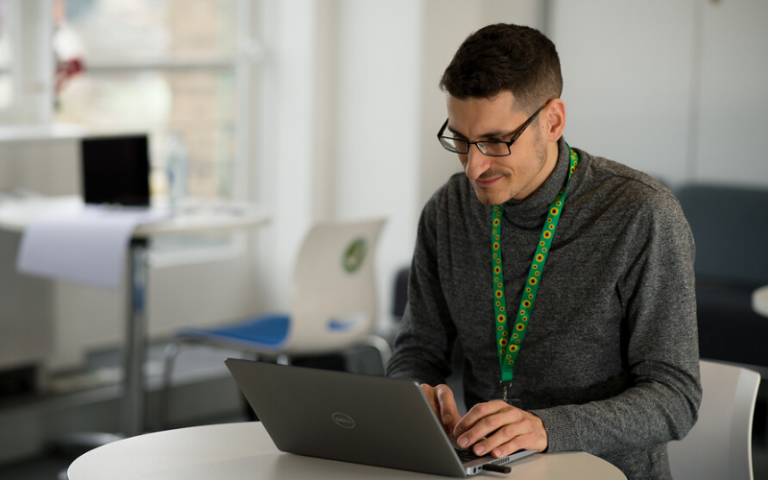What you can expect from Disability, Mental Health and Wellbeing at UCL
27 October 2021
Looking after our mental health during university is central to helping you thrive academically, socially and personally. UCL Mental Health Coordinator Sandra writes about her role at UCL, how she supports students and gives you a few tips.

Looking after your mental and physical health is very important, as a Mental Health Coordinator my role is to support and assist students in this process whilst they study at UCL.
Let me introduce the Disability, Mental Health and Wellbeing Team (DMHW). Mental Health Coordinators and Student Wellbeing Advisors provide one-to-one non-therapeutic support and guidance to enable students with mental health difficulties to thrive and succeed, we respond to students needing specialist or urgent support by liaising with external NHS professionals and teams, we deliver supportive and informative workshops, maintaining our administrational responsibilities answering and responding to queries from students and staff via askUCL.
Specialist Mental Health Mentors, provide emotional support, supporting students with strategies to manage their symptoms whilst studying, implementing coping strategies, problem solving and discussing practical support.
Disability Advisors support students with long term health conditions, visual and hearing impairments, physical disabilities, students with Autism Spectrum Conditions and Specific Learning Differences. Specific Learning Differences Tutors assist students with academic support, organising their studies, advise on tools and techniques, planning and structuring to complete assignments, recommend assistive technology to support their studies and strategies to help with revision and exam preparation.
And finally, our Disability Administrator helps students to access dyslexia and dyspraxia diagnoses and oversees the administration for the DMHW Team.
A day in the life of a Mental Health Coordinator
We offer same day and advisory appointments - this is where I get to meet students! Students have the option of requesting a remote appointment by phone or Microsoft Teams video call which is usually most convenient for them. Students can also request an in-person appointment, these are carried out in the Student Centre (where our team are based).
To enable students with mental health, physical conditions or learning differences to access their full education together we discuss and put in place a Summary of Reasonable Adjustments (SoRA) to remove barriers to learning. We also advise departments on how to implement SoRA adjustments. We assist in helping students to apply for Disabled Student Allowance (DSA) - through DSA there’s funding available to you for additional support like mentoring, study skills, you may even be eligible for assistive technology and equipment. We respond to Student of Concern reports, reaching out to students who may be struggling, and we offer help and advice to ease students' worries and concerns. A large part of the role involves sign posting to various internal and external services. In addition to our student work, we provide training to staff to support inclusive learning practices and highlighting the impact a lack of accessibility can have on students.
What I love about my role is the interaction with students. I especially enjoy meeting students from a wide variety of backgrounds and seeing each one as unique. I take an individualised approach, listening to their concerns and aiming to alleviate any anxiety they may be feeling. It's fulfilling and rewarding when I see and hear how the support, we have given has made the student feel and made a positive difference. My aim when engaging with students is to empower and encourage them to seek emotional, academic and mental health support, and also making them feel welcome to come back at any time by removing any fear or stigma they may have felt or experienced in the past.
Tips to support your mental and physical health
Have a read about the Five Ways to Wellbeing and consider my five tips:
1. Talk to friends, family, tutor or get in contact with support services
2. Exercise, walk, run, yoga, go to the gym - anything you enjoy!
3. Eat a balanced diet which includes eating plenty of fruit and vegetables
4. Keep well hydrated by drinking at least 6-8 glasses of water a day
5. Sleep is important, it is recommended to have between 6 to 8 hours
Seek support early
I find students tend to struggle alone; they often feel that what they are feeling is not important in comparison to someone else. Take it from me: you are equally as important as anyone else. If a situation has a negative impact on you, affecting your mental health or physical health; it is time to seek help. If you are feeling stuck, if you notice a change in your mood, eating habits, sleeping patterns, not doing the things you would normally enjoy, or you feel stressed or worried - don’t wait, we are here for you. You can contact the Disability, Mental Health and Wellbeing Team (DMHW) by booking an appointment to speak with an advisor by raising an enquiry on askUCL or calling 0207 679 0100.
Whilst you are studying at UCL, it is essential you registered with a GP in London: they are a great source for advice and support with your mental health. You can find the closest GP to you here.
Remember, the most important thing is to make sure you look after your mental and physical health and seek support sooner rather than later. I hope you enjoy your time with us at UCL.
Sandra Christian, Mental Health Coordinator, Student Support and Wellbeing
 Close
Close

